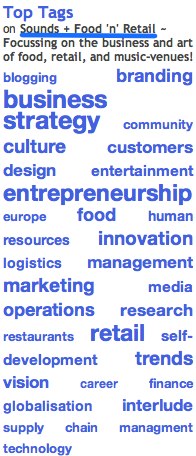- electricpublishing.blogspot.com
- favourits.blogspot.com (purposefully mispelled)
- justforsng.blogspot.com
- foodandretail.blogspot.com
- personal blogsites
- I'll slowly import my writing www.TechITEasy.org as well.
Filed under: About
 I bet you that these are two words you won't often read in the blogosphere. Usually when something ends, it is accompanied by a deafening silence, which, years later, is broken by a nice 404-page announcing that this page/blog no longer exists.
I bet you that these are two words you won't often read in the blogosphere. Usually when something ends, it is accompanied by a deafening silence, which, years later, is broken by a nice 404-page announcing that this page/blog no longer exists.
I don't like ending things, but prefer to do so as loud and clear as possible, as it both forces me to stop something and to do something else instead.
So this blog has ended! Which is logical, as it has, from the beginning, been a limited enterprise, a conduit into the world of food and retail, even though I'm pretty much decided—though never say never—that the food-industry is not where I am going.
The truth is that I have learned a lot these last 6-7 months, enough to form a relatively clear vision of what I want and what values I believe in. The food-industry is a great vehicle for that:
- It's low-tech, it's not rocket-science to follow the path of a good from the farm to a person's kitchen.
- It's a people-business (whatever Harvard business review may say), and understanding people's taste and expectations of food is translatable to any other industry.
- It's a global industry and affected by economic cycles, just like any other industry.
- It's got a variety of business models to choose from—from restaurants to supermarkets, from franchises to super—fmcg—companies.
- etc. etc.
Reasons for me to stop are personal and I won't discuss them here*. These last few years, I wrote a lot, which means I had to come up with new ideas daily, find new and better ways to communicate them, and of course gather new information constantly. And I enjoyed it most of the time, though now it is time to put those creative and problem-solving skills to use in a different environment.
So… here I go and retire from this activity. That also includes my work on Tech IT Easy, btw., though I expect that my co-bloggers are more than capable of producing great content (and hope this post hasn't depressed them too much).
In the words of Mr. Hodgman, "That is all!", and in the words of Mr. Murrow, "Good Night, and Good Luck!"
Sincerely yours,
Vincent van Wylick
*: Anyone who knows me, knows that they can reach me anytime and discuss what's going on in their life and mine. To the visitors of this blog, you can also feel free to drop me a mail, knowing that, even though any subject will be treated with complete respect and confidentiality, my time is limited.
 Still don't have too much time at the moment, but trying to produce content if possible, in a quick and (hopefully) digestible format. Some qualities of entrepreneurs that I'm thinking about:
Still don't have too much time at the moment, but trying to produce content if possible, in a quick and (hopefully) digestible format. Some qualities of entrepreneurs that I'm thinking about:
- Perseverance: This is a tough, tough issue. I consider myself a person that bites into a project and doesn't let go; at the same time there are times when you have to or should abandon an idea. Even so, a start-up is an 80 hour a week job (let's say), it has stakeholders—investors, partners, employees—and it may take some time to go into the black. Perseverance is probably the most important quality to possess, but I'd love for it to be simpler to know when to persevere and when to abandon.
- Instinct: it's a funny thing, this one. There is of course good and bad instinct (e.g. bravery vs. fear), but sometimes a "bad" instinct is a good one too (fear > jump > evade car). And even if you try to follow your instinct, your rational self—your experiences, education, arrogance, other emotions—will want to interfere with it. The reason to follow instinct is because it's quicker and a more natural way to be (and my theory is that natural = confidence = charisma and all that good stuff). Still a tough one.
- Inside-knowledge: in an industry, sure saves you a lot of time finding contacts and focussing on the right stuff.
- The numbers: are important in a numbers-business. And every business is ultimately a numbers business, maybe not at the beginning when there's lots of growth, but certainly at that point when either your wallet begins to look empty or a competitor is moving in next door.
- Money: is kind of nice. The more you have, the less you need to give away in equity. Of course, rich parents help, but so does having an investment-portfolio. Investing in your industry means that you keep track of the latest trends, of your competition, and if you make money from that, that's a qualifier that your instincts are correct. And, ultimately, giving away equity to the right people, means having a smaller piece, perhaps, but of a bigger pie.
The picture is courtesy of fairinvestment.co.uk
Filed under: business strategy, entrepreneurship, finance, retail, self-development, venture capital, vision
 Disjointed, because I don't have the time or energy to write a beautiful essay about empowerment—I'm not even 100% certain what it means yet. And in a way, by writing about 'empowerment,' I'm breaking the first rule, which is "Don't speak about empowerment." Or at least it seems that way. Currently, there's around 505,000 articles online about the term, which qualifies it as a hype and as such something that has already been discussed too much. But also, empowerment is basically about trust, a behaviour, and how can you talk about a behaviour, you just behave.
Disjointed, because I don't have the time or energy to write a beautiful essay about empowerment—I'm not even 100% certain what it means yet. And in a way, by writing about 'empowerment,' I'm breaking the first rule, which is "Don't speak about empowerment." Or at least it seems that way. Currently, there's around 505,000 articles online about the term, which qualifies it as a hype and as such something that has already been discussed too much. But also, empowerment is basically about trust, a behaviour, and how can you talk about a behaviour, you just behave.
I think I first came across the concept, without even using that term. A few years ago, I read a book on ants, called "Emergence." It was a great book, I thought, about how ants at every level exchange signals, in the shape of pheromones, to indicate what they were doing and whether they needed help. A completely decentralised organisation, and the only thing the queen needed to do was produce babies, which, equivalent in business-talk, is, I guess, take care of human resources. I was so excited about it, that it became a research proposal for my master-thesis in strategic management, and was very quickly rejected, as I guess I hadn't related it well to strategy.
I again came across the concept last week, after reading an interview with the then-CEO, Dennis Bakke, and the then-chairman, Roger Sant, of AES, a power-company, which was, at least at the time of the interview (1998), very big on empowerment. And it seemed to work pretty well for them, if you look at their share-price, it rose pretty steadily up to 1998, and even more up to ca. 2001. Though, it hasn't been doing quite as well these last few years.
Reading the interview, I got the impression that empowerment is a religion, which in itself is hard to quantify into a set of rules. Essentially, at AES, it was (or is, I don't know) a system of open exchange flows; people could evaluate each other's performance, investment-decisions were decentralised and crowd-sourced, job-rotation was common, and micro-teams of ca. 10 people, focussed on different projects and tasks, were spread all around the organisation. And that seemed to work pretty well.
But there were also some downsides, such as that the company didn't work well with other companies—rather, it preferred a contractual relationship—and there were constant pressure to revert back to the traditional top-down model, from the public, share-holders, even employees. Essentially, every employee at AES becomes a kind of mini-CEO, which is clearly not something everyone is conformable with.
And the question is, and I haven't figure that out 100% yet, is how you come from that top-down view of human "resources," to a decentralised ant-like model? The key-word, which is equally hyped but seems to apply, is "delegation"—i.e. shifting executive responsibilities out to a team.
I think the problem of this is quite well spelled out in a recent interview with Brad Bird from Pixar, who was at one point confronted with a team that was demoralised. The former director had taken their work and evaluated it in private, giving written comments to individuals, not giving them a chance to give any input. And in order to turn that team around, he had stand in front of them for two months, evaluating the work, in public, and encouraging to take part, through questions. Two months, it took to go from the traditional model to one of empowerment, and just for that team.
The good news is that for start-ups, this is pretty much the way it should be from day 1. The bad news is that for big companies, or as soon as a start-ups grows bigger, the dissonance between people becomes larger and larger. And you have to—if you want to, at least—find ways to decrease that gap, probably most easily achieved through team-building after team-building exercise.
Anyway, not much more to say about this for now, but empowerment is cool, let's leave it at that.
Ah yeah, I forgot! I liked these interview questions, which were typical of an AES job-interview at that time, and made me think about my own opinion on empowerment:
- Should everyone be treated equally? Explain.
- What do you do when something needs to be done and no procedure exists?
- What self-improvement-efforts are you making?
- Recall a time when people around you weren't being entirely honest. What did you do?
- What does "fair" mean to you? How important is fairness?
- For what have you been counselled about the most?
- What is the most difficult situation you have faced? What did you feel? How did you react?
- Describe two important achievements.
- Tell me about a time when a decision was needed and no supervisor was available.
- What kind of rewards are most satisfying to you?
- What does "fun on the job" mean to you?
The picture is of course of Che Guevara, who wasn't an entirely nice guy, but does stand for this whole "power to the people" movement.
Filed under: business strategy, career, culture, entrepreneurship, ethics, human resources, management, operations, retail, self-development, trends, vision
 This is going to be a nice and short one. April 2008 can be characterised by three types of posts: general business, food and retail (yay!), and interludes-after-interludes (the latter is just a naturaly consequence of time/creativity-problems, sorry). Previous monthly wrap-ups can be found here.
This is going to be a nice and short one. April 2008 can be characterised by three types of posts: general business, food and retail (yay!), and interludes-after-interludes (the latter is just a naturaly consequence of time/creativity-problems, sorry). Previous monthly wrap-ups can be found here.
Let's get started!
General business
I think I started with people-businesses, a topic I find interesting and will likely write more about in the future. Essentially, a people business is one whose value is mostly made up of people, which, I believe, includes most start-ups, but excludes businesses like McDonalds, which has a lot of capital costs. There are a number of challenges related to such businesses, such as measuring/increasing productivity, and finding business models that are compatible.
The next (micro-)topic I discussed, was bootstrapping, which I thought depends on three abilities: low cost-living (duh), time-management skills, and a strong goal-orientation (lots of distractions on the way to enlightenment).
Another micro-topic was on taking a detached view towards business. A lot of business-people and entrepreneurs, serial ones mostly, talk about seeing their business as just another business, rather then a passion, executing the right levers to make it succeed and eventually focussing on the next challenges. You have to be strongly motivated by something though, and I guess, following Ram Charan's logic, the passion is for business itself, which can be an exciting and all-consuming activity. Well, that wasn't exactly what I wrote, but is what I was thinking! ;)
Finally, for general business, I linked to three interesting stories, which I quoted here, but which illustrated the importance of the team, the "test," which shows the level of understanding a leader must have about his business, and the "rule," which is that every action has some sort of reaction elsewhere.
Food & Retail
Let's start with the challenges facing the food-industry, which are currently related to economics and the environment. Economics-wise, everyone is seeing high food-prices due to events going on around the world, including a shortage of oil and an increased demand for farming-goods from India and China. Eventually, an equilibrium will happen, either the demand will subside as production happens locally (unlikely in the short-term), or production will increase. Considering I just heard that dairy prices are falling, I'm betting on the latter. For environmental-costs, we are mainly speaking about the cost of transportation. Food is a very global business, which seems to come at a high price to the environment. No solution is in sight for that yet, I don't believe living locally is as yet sustainable, though there are plenty of proponents for that way of living.
A second topic, I looked at, was beer and the way pubs are funded in the Netherlands, which is often through exclusivity-contracts with breweries. It's an interesting situation, as breweries have been facing the problem of commoditisation for that reason; people order "a beer" instead of a Heineken or a Grolsch (mmh, Grolsch). It seems to be good for the horeca-industry as it suffers from high failure-rates, but at the same time, other countries, like the UK, seem to manage without exclusivity-contracts, at least as far as I know. Requires further research.
A retail-topic was about the differences between Spanish Zara & Swedish H&M, both fashion-businesses, with a different business-structure, but otherwise fairly compatible in attitude, I think. Both have a strong design-branch, focus on cheap, high-quality fashion, and have an extremely high IT-focus, which helps them manage logistics and merchandising at an elevated level. The differences arise with Zara being very vertically integrated, owning producers, supplier, and retailers, most likely because Spain is such a low-wage country traditionally. H&M is not so integrated, probably because of Sweden being such a high-wage country. And while H&M is very strong in terms of marketing, Zara does virtually none of it, but draws high repeat-visits from its customers, due to constantly releasing new fashion-lines (3-5 x more then comparable businesses).
Some lists then, Coke Zero no. 1 in the Netherlands, and incidentally the first food-related topic I wrote about, I think. And a list of the top-horeca-businesses in the Netherlands, mostly hotels, but also some retailers, like Hema, which I like as a business.
Interludes
A lot of interludes this month, as it's my way of recharging creative energy. These posts can be divided into ones posted here, and others posted on Tech IT Easy. Let's start with the first.
The flirt was about some of the variables involving flirting, which I consider useful information, but probably not food 'n' retail. The cookerlude was my attempt to do a regular posting on cooking, but I'm still not sure whether I'll go that direction.
On Tech IT Easy, I wrote a couple of interesting posts last month. Two on blogging, why it isn't for everyone and what competitive advantage means for some. One on copyright, which is a topic I'm pretty interested in and which Fidji Simo continued with her usual insights. And the latest on technology-incubators, which relates to research done for my thesis.
That's about it! Happy to close the door to the last month and already busy thinking about the next one!
Filed under: blogging, Monthly recap, retail, vision